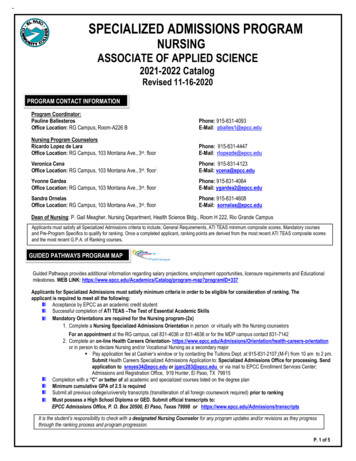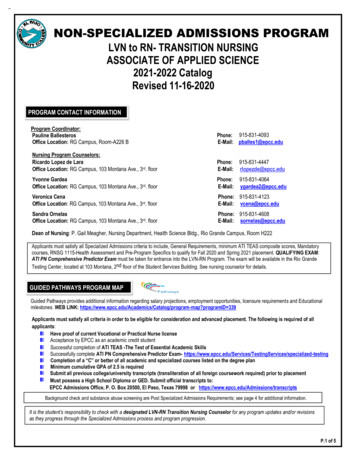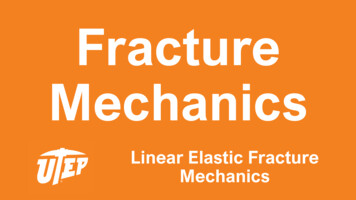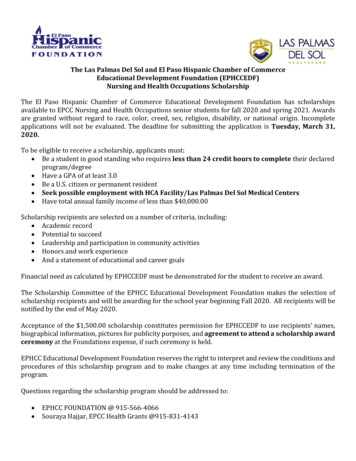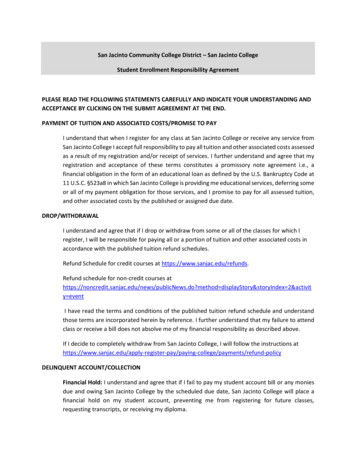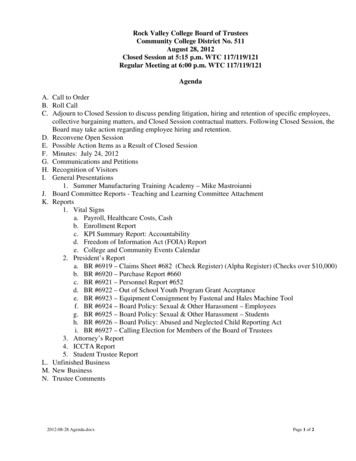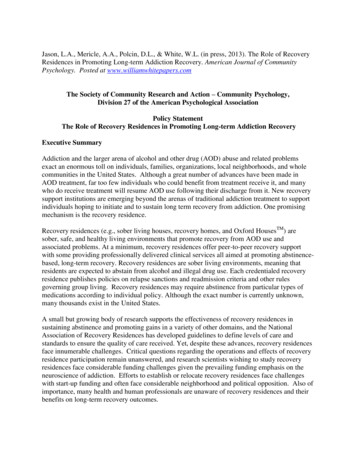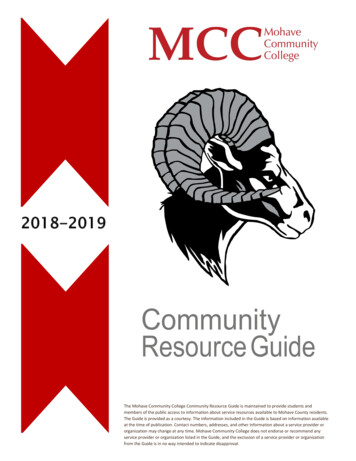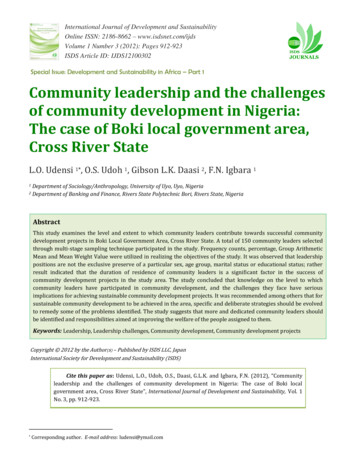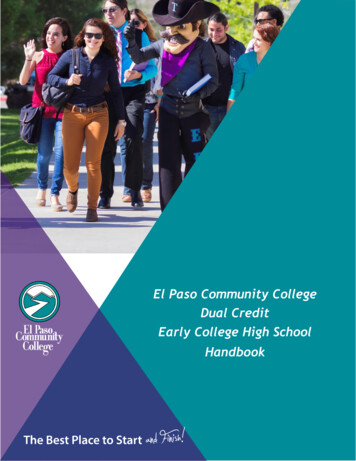
Transcription
El Paso Community CollegeDual CreditEarly College High SchoolHandbook
Table of ContentsSection 1 – Welcome and Introduction . 1About Dual Credit . 1About Early College High School . 1EPCC Courses and Access to Programs . 1Section 2 - Information for Students . 2Student Eligibility . 2Eligibility Criteria . 2Application/Registration Requirements for Dual Credit . 2Placement Testing/Test Scores for Placement . 3Family Educational Rights and Privacy Act (FERPA) of 1974 . 4Rights of Individuals with Disabilities . 5Specific Criteria for Home-Schooled Students . 6Student Responsibility . 6Student Expectations . 6Attendance Policy . 7Tutorial Assistance . 7Library Resources. 7College Transcripts . 8Withdrawing/Dropping a Course . 8Financial Aid . 8Student Academic Issues . 8Section 3 - Definitions. 9Section 4 – Resources and Services . 10Banner System . 10Blackboard. 10Bookstore . 10Campus Life . 10Career and Transfer Services Center . 10Center for Students with Disabilities . 10EPCC E-Mail. 10Office of the Dean, Dual Credit and Early College HighSchoolPage 3
Honors Program . 10Libraries . 11Testing Services . 11Tutorial Services . 11Online Catalog . 11Download your Grades . 11Print a transcript request form online for official transcripts . 11Download your Unofficial Transcripts . 11Texas Common Course Numbering System (TCCNS.org) . 11Obtain Your Degree Plan Online. 12Download your Degree Evaluation . 12Steps to Degree Evaluation . 12Section 5 - Contact Information . 13College Mailing Address . 13Phone, Office of the Dean, Dual Credit and Early College High Schools . 13Helpful Phone Numbers. 13Office of the Dean, Dual Credit and Early College HighSchoolPage 4
Section 1 – Welcome and IntroductionAbout Dual CreditThe Dual Credit Program provides an opportunity for qualified high school students toenroll in college-level courses. You can earn college credit and high school credit atthe same time by taking EPCC college courses for dual credit at your high schoolcampus. This experience can significantly increase your prospects for success andgraduation from college and/or university and it’s free!About Early College High SchoolWe are proud to collaborate with your Early College High School to provide you withthe opportunity to experience challenging and high-quality college courses whilecompleting your high school requirements. After completion of the two-year collegedegree you would have acquired the confidence to succeed academically at the fouryear college or university of your choice.EPCC Courses and Access to ProgramsWe welcome you to research EPCC’s degree plans and the courses that are offered atthe high school. The choice will benefit you as you continue to pursue a collegedegree. For steps on how to download EPCC’s Degree Plans, visit the Catalogs andSchedules webpage.EPCC offers pathways toward Associate of Arts, Associate of Science, Associate ofApplied Science, and Certificates of Completion as described in the college catalog.Admission to these programs is based on college admission requirements andindividual program policies as outlined in the catalog and throughout this handbook.Dual Credit Handbook for Parents and StudentsPage 1
Section 2 - Information for StudentsStudent EligibilityEl Paso Community College offers you the opportunity to enroll in college courses fordual credit at various private, parochial, and regional high schools. There are certaincriteria and requirements that you will need to meet in order to be able to takeadvantage of this opportunity.Eligibility Criteria1. As a condition of participating in the Dual Credit Program, your principal, you,and your parent/legal guardian must sign a Request for High School EarlyAdmissions/Dual Credit Program Form (EA) available at under the Dual CreditDocuments webpage authorizing EPCC to release assessment scores, grades,and academic progress reports to the high school.2. You must complete the admissions process and take the EPCC placement testand/or provide EPCC approved additional test scores in math, reading andwriting, as well as course specific placement test scores where applicable. Youmust also meet program specific requirements (e.g., immigration status, holdsand placement testing issues). Students will be permitted to enroll only incollege level courses for which they are eligible (as determined by the currentEPCC course placement rules) and must meet all course prerequisites prior tobeing enrolled.3. You must maintain a minimum Grade Point Average (GPA) of 2.0 to remain inthe program.4. If you are pursuing a Career and Technical Level One Certificate, you areexempt from TSI requirements for enrollment in courses under the certificate.If you are interested in this option, you should contact a Dual Credit counselor.As an Early Admissions student, you are eligible to take additional college courses atnight, on weekends and/or in the summer for college credit only. However, you wouldbe responsible for paying tuition and purchasing your books. For more information,contact a Dual Credit Counselor. Note: Summer enrollment is considered onesemester (check with your Dual Credit high school contact for summer classenrollment).Application/Registration Requirements for Dual CreditEPCC’s Dual Credit Student Services Office works closely with each high school toensure students meet all EPCC early admission requirements for Dual Credit. Incollaboration with your high school, you will need to complete the following:1. Fill out an Application for Admission at www.applytexas.org.Dual Credit Handbook for Parents and StudentsPage 2
2. Fill out an Early Admissions Form and sign it. Have your parent or guardian andyour high school principal sign it.3. Have your school provide EPCC with an Official copy of your current transcriptreflecting eligible test scores. (If test scores are not posted, high school mustsubmit test scores).4. Print and save a copy of the Letter of Acceptance to EPCC.5. Take EPCC’s PAAM and TSI placement test.6. Attend a New Student Orientation (NSO).Once all requirements are met, the Dual Credit Office will enroll you in the collegecourse(s) according to the rosters submitted by your high school. Your first point ofcontact for any questions or concerns regarding your dual credit enrollment should beaddressed to the high school administration or contact for resolution.Note: You may take as many courses as permitted by law. Make sure that you enrollin courses that apply to your degree plan.College developmental level courses are not offered to dual credit students.Financial aid is not available while you are a high school student.Once you submit your admission application to EPCC, you will receive your EPCCuser ID Number, Username and EPCC e-mail address as part of your acceptanceletter through your personal e-mail address you provided on the APPLYTEXASapplication.Make sure to check this email frequently. Here is a sample of what your emailaddress will look like:johndoe2@my.epcc.eduOnce you have your EPCC ID# and Username, go to my.epcc.eduUse your email address (username @my.epcc.edu) and your EPCC password to login.For additional assistance, visit a campus Academic Computing Services (ACS) lab orcall the Service Desk at (915) 831-6440.Placement Testing/Test Scores for PlacementPrior to scheduling the Texas Success Initiative Assessment (TSI), you need to havecompleted the Pre-Assessment Activity Module (PAAM). It is an online module requiredby state law. You will not be allowed to take the TSI assessment until you havecompleted the PAAM. Visit the Placement Testing Services webpage for moreinformation.Dual Credit Handbook for Parents and StudentsPage 3
Family Educational Rights and Privacy Act (FERPA) of 1974The Family Educational Rights and Privacy Act (FERPA) is a federal law designed toprotect the privacy and accuracy of educational records. It affords students who aretaking classes that earn college credit the following: The right to inspect and review their educational records maintained by theschool;The right to request that the school correct errors in their educational records;The right to consent in writing to the disclosure of personally identifiableinformation from their educational record, except under certain permittedsituations; andThe right to file a complaint with the Family Policy Compliance Office (FPCO)regarding an alleged violation under FERPA.It should be understood that these FERPA rights reside with the student – regardless oftheir age – in regards to Dual Credit and Early College High School classes wherecollege credit is being earned.FERPA does allow the release of Directory Information without prior written consent.At EPCC Directory Information includes: Name (last name, first name, middle initial)Address (street address, city, state, zip code)Area code and phone numberCollege e-mail addressAge and birth yearMajor or program of study at EPCCClassification (freshman, sophomore)Enrollment status (full-time, part-time)Dates of attendance at EPCCCredit hours completed and in-progress at EPCCDegrees earned and dates of degrees at EPCCStudents currently enrolled at EPCC may request that all or part of their directoryinformation be withheld from the public by filing a written request at the time ofregistration. Such a request will remain in effect until the student authorized itsremoval in writing. Release of any additional information pertaining to studentrecords must be authorized in writing by the student, except as authorized under thelaw.Admissions & Registration determines what constitutes an educational record, andwhat may be disclosed without prior written consent. However, it is best to assumethat written consent is always required in order to release student information to athird-party.Dual Credit Handbook for Parents and StudentsPage 4
Admissions & Registration will supply students with information related to theircollege records and refer those student requiring additional assistance to the propercollege official or office. Admissions & Registration can be reached at (915) 831-2150.Please visit Catalogs and Schedules for additional information.Rights of Individuals with DisabilitiesThe EPCC Center for Students with Disabilities (CSD) has offices at all five campuses:Mission del Paso, Northwest, Rio Grande, Transmountain and Valle Verde. The CSDprovides students, regardless of disability, if qualified, an equal opportunity tocomplete their educational goals through the provision of accommodations basedupon their individual disability.If you are interested in taking college courses for dual credit in your high school orearly college high school, it is important to understand that EPCC is guided by theAmericans with Disability Act (ADA). The special education student in public school isunder the Individuals with Disabilities Education Act or IDEA. There are differences inappropriate accommodations between these acts that need to be understood byfaculty, students and parents. In a Dual Credit/ECHS class the SPED student will comeunder the jurisdiction of the ADA, not IDEA. The ADA offers accommodations at thecollege level whereas IDEA requires modifications at the high school level.Accommodations change how a student learns the material. A modification changeswhat a student is taught or expected to learn.To receive department services, you must: Identify yourself as a person with a disabilitySchedule an appointment to see a CSD Counselor and bring documentation.Seeing a Counselor is required prior to taking the TSI and at the beginning ofeach college course if accommodations are needed and accommodations arenot retroactive.If you qualify for IDEA or 504 and want to take college courses for dual credit in yourcomprehensive or early college high school, you will need to take the Texas SuccessInitiative (TSI) with college level accommodations.To take the TSI with accommodations, you will need to: Make an appointment to meet with a Counselor with the Center for Studentswith Disabilities (CSD) located at any of the EPCC campuses.Make an appointment to meet with a Counselor at the CSD located at any ofthe EPCC campuses.Make arrangements with the high school TSI Coordinator to take the TSI withCSD Counselor approved accommodationsAfter passing the TSI the student will need to contact the CSD counselor eachsemester for appropriate class accommodations for any College class taken.Dual Credit Handbook for Parents and StudentsPage 5
For further information and assistance, contact the CSD at (915) 831-2426 or visit theCenter for Students with Disabilities webpage.Specific Criteria for Home-Schooled StudentsHome-Schooled students must provide documentation consisting of transcripts andcurriculum indicating that the home high school course being replaced by the collegecourse is require for high school graduation. These documents must be submitted to aDual Credit Counselor. For further information, call: Seleste Comer-Cardoza – (915) 831-3315Student ResponsibilityThe instructor is available to answer questions about course materials or classpolicies. If you have any concerns about your performance in the course or are notsure of an assignment, you should speak with the instructor.Student ExpectationsAs a Dual Credit student, you should remember that a Dual Credit course is a collegecourse in all aspects. You are expected to follow the same curriculum that is used foron-campus students and their responsibilities are the same. College coursessometimes deal with controversial issues or subject matter that high school coursesmay not address, which can provide new challenges for the Dual Credit student.Nonetheless, as a Dual Credit student you should be prepared and interact with theinstructor as any on-campus college student. All college students should expect toinvest at least double the time out of class as the time spent in class in reading,studying, and preparing for college course assignments. To be successful and toensure completion in a one-hour class of instruction, you should spend two hoursstudying and completing class assignments daily.You should pay careful attention to your instructor’s system for assigning grades.Often the college grading system is different from the system that the high schooluses. The instructor’s grading system is covered in the course syllabus that you willreceive during the first week of class. If you have questions or concerns in a DualCredit course, it is your responsibility to ask the instructor what you need to improveto succeed in the class.El Paso Community College has established a system of rights and responsibilities forstudents collectively known as the “Student Code of Conduct”. It helps to explainstudent’s right, responsibilities, grievances, and complains procedures, rules andregulations for general student behavior, discipline policies, and general guidelinesthat all students are expected to follow.Visit the Catalogs and Schedules webpage for additional information.Dual Credit Handbook for Parents and StudentsPage 6
Attendance PolicyWhile you are a student at EPCC, it is your primary responsibility to attend classes andcomplete the coursework to earn a grade. The instructor’s attendance policy iscovered in the course syllabus that students receive in the first week of class; itoutlines the topics, test dates, assignments, grading criteria for the class, courseobjectives, instructor’s office location, phone number and schedule office hours soyou can contact the instructor if you have any questions or concerns. In college,absences are handled differently than in high school. Student’s absences due to illnessor participation in a school function may be counted against students. Additionally,students should not expect to receive extra credit for attending class.Visit the Catalogs and Schedules webpage for additional information.Tutorial AssistanceAs an EPCC Dual Credit Student, you have access to the same support services as anyEPCC student. Several types of academic support are available and may be of help toyou: Tutorial Support Services provides students with many resources including inperson tutoring, study-guide resources, and online tutoring. Visit the TutorialServices webpage for more informationThe Valle Verde and Rio Grande Writing Centers offer face-to-face and onlinetutoring to students taking English and other courses. Visit the Writing Centerwebpage for more information.The Pre-testing, Retesting Program (PREP) can help you improve your collegeplacement scores by providing computer assisted tutorials in Math, Reading,and Writing. Visit the Pretesting Retesting Educational Program for moreinformation.Visit the College’s Resources and Services webpage for more information on tutoringand other services. You are welcome to come to any on-campus tutoring center duringscheduled hours.Library ResourcesWhile the resources of the high school library may meet most of the research needs ofDual Credit students, you may access the EPCC system as well. Every EPCC student isg
degree you would have acquired the confidence to succeed academically at the four-year college or university of your choice. EPCC Courses and Access to Programs We welcome you to research EPCC’s degree plans and the courses that are offered at the high school. The choice will benefit you as
